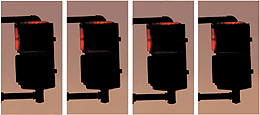 I heard this man interviewed on the radio this morning. And having done so, I unleashed a stream of language so long, strong and vulgar that I surprised even myself. Why so ?
I heard this man interviewed on the radio this morning. And having done so, I unleashed a stream of language so long, strong and vulgar that I surprised even myself. Why so ?
The man in question is Ian Johnston, president of the Police Superintendents' Association. He was talking about the the recommendation of the Advisory Council on the Misuse of Drugs (ACMD) that ecstasy be downgraded from a Class A to a Class B drug.
The Chairman of the ACMD, the unfortunately named Professor David Nutt, had trialed the proposal at the weekend, claiming that taking ecstasy is roughly as risky as getting on board a horse. Whatever the statistical basis of the argument, the message is clear: the Establishment's continued insistence in putting ecstasy in the same bracket as drugs like crack cocaine in just plain daft and not remotely based upon fact or risk. To many of us, his comments were simply common sense. Ludicrously, his candour earned him a rebuke from Jacqui Smith and some campaigners called for him to resign. This morning, post publication of ACMD's report, Ian Johnston waded in with the usual emotional tirade.
"This is not some academic or scientific exercise, this is dealing with people's lives," railed Johnston. "If we downgrade ecstasy, we are in danger of sending mixed messages out to young and vulnerable people". And on the Today Programme, he went on to claim that young people in night clubs are incapable of telling the difference between the risks of taking ecstasy and other Class A drugs. This was when I got seriously angry, because it is absolute and demonstrable tosh.
The point is obvious. Many young people in nightclubs clearly do know the difference in the risks, which is why ecstasy is the most popular illicit drug (police estimate that 5 million tablets are taken every month) and yet causes a such strikingly low level of harm.
Johnston's assertion that downgrading ecstasy would send mixed messages is also complete nonsense. It is far more dangerous to have a banding of illegal drugs which people know to be fundamentally flawed.
The State's attitude to drugs is not particularly based on their danger; it is based on history and what they think they can get away with. If the State thought it could ban alcohol, it would. On the other hand newly available drugs are treated with automatic hostility. The government's position, and its refusal to change outdated and clearly refuted policy seemingly cast in tablets of stone, is irrational.
Why is this important ? Because the war on drugs is lost. The government cannot even control the movement of drugs within the prison system, never mind anywhere itself. The law is widely treated contemptuously or ignored altogether by huge sections of the population, and the artificially high price caused by drugs' status as illegal itself accounts for a huge proportion of the nation's crime. The police are engaged in a constant and soul destroying tail-chasing exercise which sees them trailing in the wake of the suppliers and crisis-managing the antics of the users. To my mind the arguments in favour of widespread legalisation get stronger by the day. In many ways, the ACMD have come up a long way short, because the time has come for liberalisation, and we may as well start with ecstasy. Yes, it causes deaths. Big deal. So does crossing the road.
Whatever the best solution might be, we quite obviously need an entirely different approach, based on an open and honest debate, to which Professor Nutt and his team have at least tried to make some sort of contribution. What we don't need is knee-jerking coppers flying off the handle.







No comments:
Post a Comment